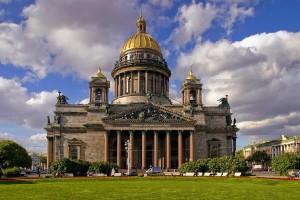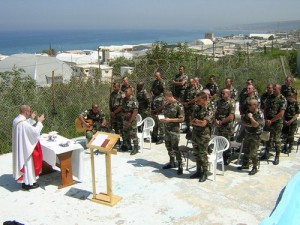One bright sunny Sunday morning as a senior in high school, I came downstairs and announced to my stunned parents that I wouldn’t be going to Mass that day or ever again. A few months later, there was an explosion of insight within that changed my life as dramatically inwardly as my declaration of independence from Catholic ritual had outwardly.
 After that so-called mystical experience, it wasn’t just Catholic ritual and ceremony that became anathema to me, but all organized religion. Even at that naïve age, religions seemed to have little or nothing to do with spiritual truth.
After that so-called mystical experience, it wasn’t just Catholic ritual and ceremony that became anathema to me, but all organized religion. Even at that naïve age, religions seemed to have little or nothing to do with spiritual truth.
With the ingenuousness of youth, I wondered why most people didn’t see this simple fact, but as I grew older, I came to understand that however misplaced the religious impulse may be, the human need for security and community is a powerful motivation.
The turning point in a more compassionate, if no less uncompromising understanding of religion came at the end of a business trip to the Soviet Union in January of 1990. Though I was having daily business meetings with my perestroika partner in his spacious apartment (indeed, I was staying in his room, which he and his wife had generously insisted I take), I was continually asked in those dying days of atheism in the USSR if I was religious.
Religioznyh bez religii in Latin script is what I said through my translator— religious without a religion. They said it even sounded good in Russian. Sounded good yes, but Russians still returned en masse to the Russian Orthodox Church, which is even more ornate and anachronistic than its Roman Catholic cousin. That is the short and unfortunate history behind Putin and Pussy Riot.
Somewhat against my wishes, my Russian hosts took me to every church we had a few spare minutes to visit. They varied from the cavernous splendor of the pew-less museum of St. Isaac’s Cathedral in Leningrad, to a church in Moscow whose name has been erased from memory though the scene has been seared into my heart.
It was the only church I visited that had conducted services through the decades of communism, even through the horrors of Stalin. Piety and religious fervor had therefore been distilled down to their essence, bottled up in that one space waiting to spill out after the collapse of the Soviet Union. Why can the religious impulse find no expression in Russia, or America and the Middle East in recent years for that matter, except in moribund traditions and a return to the past?
The church was filled with candles, incense and Gregorian chanting. Every sense was instantly saturated.  Women were literally weeping in the aisles, and the whole place literally throbbed with devotion. I stood transfixed, not out of a rekindling of my boyhood piousness, but out of amazement and sorrow.
Women were literally weeping in the aisles, and the whole place literally throbbed with devotion. I stood transfixed, not out of a rekindling of my boyhood piousness, but out of amazement and sorrow.
After I left quit Catholicism, I started to go to church several times a week. Not the church of a building made by the mind of man, but the church of the natural world, where anyone can hear, if one listens, an order and infinite sublimity beyond the human mind.
I didn’t call it meditation, and even years after the explosion of insight that ended the illusion of separation within me, I didn’t use that word for it. But for lack of a better word, that’s what it is.
It has become fashionable, and therefore quite meaningless, for people to say they are ‘spiritual but not religious.’ That translates into: ‘On my own spiritual path’—with the emphasis on me, and ‘my truth.’
It should be obvious that that the truth isn’t ‘mine,’ and that if there is ‘my truth’ and ‘your truth,’ there is no truth at all. But the religion of individualism will not hear such blasphemies.
In just two or three generations, the soil of thousands of years of tradition has been eroded worldwide, and nothing is replacing it. Returning to the traditions and the moral systems of the past is worse than an exercise in futility; it hastens the inner erosion, while providing fertile ground for cynical political reactionaries such as Vladimir Putin.
Lest you think this is a Russian story, listen carefully to the tone rather than the content of many of Barack Obama’s speeches. Unless his competitive juices are flowing, his deadpan readings, so opposite from the soaring addresses that made him president, betray not just the hollowness of the man, but of a nation.
In the Islamic world, the rump of religious passion incites the slaughter of consumers in a materialistic mall of America transplanted to the evolutionary birthplace of humankind. Just as Bush-Cheney worked for the devil and called him Jesus in Iraq, heartless swine invoke Mohammed as they fly airliners into skyscrapers or gun down children shopping with their mothers.
 What can the person do that still feels and cares, despite such soul-searing events? Is there something beyond the mind and mayhem of man?
What can the person do that still feels and cares, despite such soul-searing events? Is there something beyond the mind and mayhem of man?
Many are searching, but most still look outward, even if they perform the rituals of Buddhism and sit in stony silence in oxymoronic group meditation. One has to truly know how to look within. And when a person does, they need not wander through the darkness of consciousness completely alone.
Often, at the end of the day (to use the political cliché), I’m not sure of much. The big question, whether man is plunging irretrievably into self-made darkness, haunts me. But I am sure of one thing—there is something beyond thought, and that when the mind is deeply quiet, one feels at least an intimation of the sacred.
Call the methodless process by which one quiets the mind and opens the heart meditation, or whatever you wish. But take the time and set aside activity, as well as thinking, ruminating and imagining, and simply passively observe each thought and feeling as they arise. I’ve found it helps to jot things down that one wants to think about or do, which creates inner space by setting aside past associations and present problems, and puts things in order naturally, without effort.
Sit outside if possible, and open your senses. You’ll find, if you listen openly and attentively, that you’re soon able to hear things at a distance, without naming. Let your awareness quicken and become faster than your thoughts. You’ll see that there is a perpetual habit of separation—a ‘me’ that always stands apart, an observer what is happening within one.
Observe that, allowing awareness to catch the mind in the act of dividing itself from itself, and separation ends. Then a cleansing, renewing and sanctifying movement of negation begins.
Martin LeFevre

